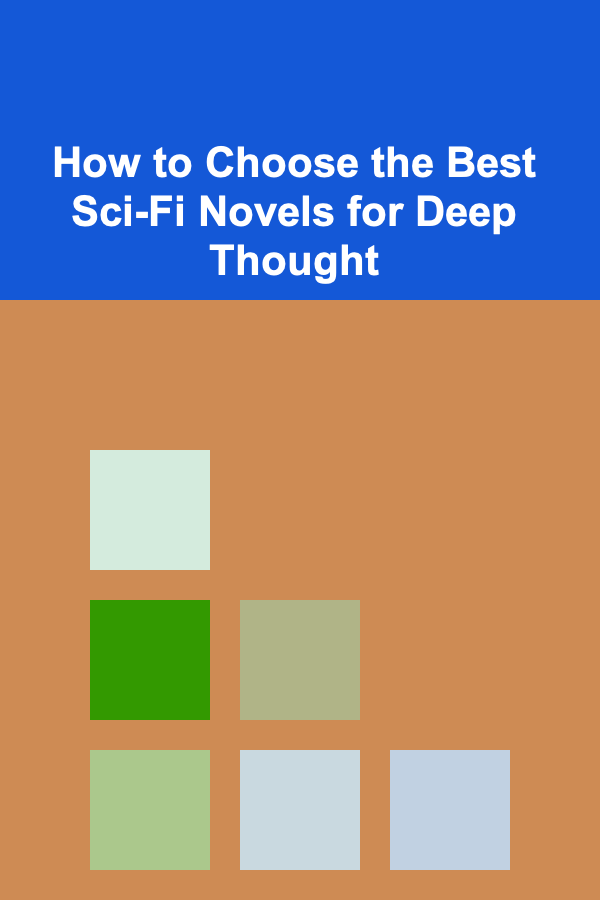
How to Choose the Best Sci-Fi Novels for Deep Thought
ebook include PDF & Audio bundle (Micro Guide)
$12.99$8.99
Limited Time Offer! Order within the next:

Science fiction (sci-fi) is a genre often celebrated for its imaginative exploration of the unknown, the futuristic, and the mind-bending. While many sci-fi novels offer fast-paced action and mind-blowing technological advancements, some transcend the typical boundaries of the genre to delve into profound philosophical and existential questions. These novels not only entertain but also challenge readers to think deeply about humanity, ethics, society, and the universe.
If you're looking to engage with sci-fi that goes beyond surface-level storytelling and prompts deep reflection, this article will guide you on how to choose the best sci-fi novels for deep thought. From understanding the core themes that provoke reflection to selecting works by authors who specialize in speculative ideas, here's how to dive into the world of intellectually stimulating science fiction.
Understanding Deep Thought in Sci-Fi
At its core, "deep thought" refers to a level of intellectual engagement that prompts questions and reflections about life, morality, and existence. In science fiction, deep thought often arises from the exploration of complex themes like:
- Human nature and identity: Sci-fi novels that explore what it means to be human, the nature of consciousness, and the boundaries between man and machine.
- Ethics and morality: How future technologies, scientific advancements, or alien civilizations may force us to rethink our moral compass.
- The future of society: Sci-fi often serves as a lens through which we examine the potential for societal evolution, collapse, and the consequences of our choices.
- The meaning of existence: Existential musings that question the place of humanity in the vastness of the universe and the search for purpose.
When a sci-fi novel effectively incorporates these themes, it often goes beyond just being a compelling story. It transforms into a tool for philosophical reflection, social commentary, and intellectual engagement.
Characteristics of Thought-Provoking Sci-Fi
Not all sci-fi is designed to provoke deep thought. While action-oriented works or space opera narratives may be thrilling, they may not engage with the more profound aspects of life. The best sci-fi novels for deep thought tend to share some common characteristics:
1. Exploration of Big Ideas
Good sci-fi isn't just about futuristic gadgets or alien invasions---it's about ideas that challenge the status quo or push the boundaries of what we understand about life and the universe. These novels often tackle questions about the nature of reality, the ethics of AI, the implications of genetic engineering, or the future of democracy in a tech-driven world.
2. Rich World-Building
While action scenes can be gripping, it's the depth of the world-building that provides the context for profound philosophical inquiry. Thoughtful sci-fi presents readers with worlds that feel real, complex, and multi-layered, offering a platform for exploring the impact of science and technology on society, culture, and human relationships.
3. Complex Characters and Psychological Depth
Characters in deep sci-fi are more than just participants in a story---they are vehicles for exploring philosophical questions. These characters often grapple with identity, existential doubts, and ethical dilemmas, providing the emotional depth necessary for deep reflection.
4. Speculative Concepts That Challenge Our Assumptions
At its best, sci-fi challenges our preconceived notions about the world. Whether it's the potential dangers of unchecked technological growth or the ethical implications of exploring the cosmos, the speculative ideas presented in the story invite readers to consider alternatives to the present and ponder futures that may seem out of reach.
5. Subtle Social Commentary
Sci-fi has often been a mirror to society, reflecting contemporary concerns and dilemmas. Novels that engage in deep thought often use the genre as a vehicle for social commentary, addressing issues like inequality, environmental destruction, or the ethical consequences of scientific progress.
Authors Known for Writing Deep Sci-Fi
When looking for sci-fi novels that challenge the mind, it helps to focus on authors renowned for their ability to weave complex, thought-provoking narratives. Here are some authors who specialize in writing deep, speculative fiction:
1. Philip K. Dick
Known for his exploration of reality, identity, and the human mind, Philip K. Dick's works often blur the line between what is real and what is illusion. His books delve into themes of paranoia, self-awareness, and the nature of consciousness. Notable works include:
- Do Androids Dream of Electric Sheep? (adapted into Blade Runner), which examines what it means to be human and the ethical treatment of artificial beings.
- The Man in the High Castle, which explores alternate histories and the consequences of living in a world shaped by oppressive regimes.
2. Arthur C. Clarke
Arthur C. Clarke is celebrated for his intellectual approach to sci-fi, exploring the future of human civilization, extraterrestrial life, and the relationship between humanity and technology. Clarke's works are often philosophical, addressing humanity's place in the universe. Key works include:
- 2001: A Space Odyssey, a meditation on human evolution, artificial intelligence, and the unknown potential of space exploration.
- Rendezvous with Rama, which ponders humanity's response to an encounter with an alien civilization.
3. Ursula K. Le Guin
Ursula K. Le Guin is famous for blending speculative fiction with deep philosophical and sociological exploration. Her works often explore themes of gender, power, and social structures. Notable books include:
- The Left Hand of Darkness, which questions the role of gender in society and explores the implications of a society that is neither male nor female.
- The Dispossessed, which contrasts capitalist and anarchist societies, challenging ideas about political systems and human nature.
4. Isaac Asimov
Isaac Asimov's contributions to the genre focus on logic, ethics, and the consequences of scientific and technological advancement. His works often engage with the interaction between humans and robots, exploring the ethical dilemmas posed by artificial intelligence. Key books include:
- I, Robot, a collection of short stories examining the moral implications of robots living alongside humans.
- The Foundation Trilogy, which deals with the cyclical nature of history and the potential for scientific knowledge to guide human progress.
5. Margaret Atwood
Though often categorized as speculative fiction, Margaret Atwood's works frequently explore dystopian futures that force readers to confront the dangers of social, political, and environmental collapse. Atwood's novels are often deeply introspective, using science fiction to highlight the frailty of human society. Notable books include:
- The Handmaid's Tale, which explores themes of power, gender, and religious control.
- Oryx and Crake, which looks at genetic engineering, environmental destruction, and the unintended consequences of scientific innovation.
How to Choose the Best Sci-Fi Novels for Deep Thought
With the sheer volume of sci-fi novels available, choosing the right one for deep thought can feel overwhelming. Here are a few guidelines to help you select books that will engage your mind and challenge your assumptions.
1. Identify Themes That Resonate With You
What are the big ideas that fascinate you? Whether it's the ethical implications of AI, the possibility of human immortality, or the question of humanity's place in the cosmos, identifying themes that resonate with your interests can help you narrow down your choices. Look for books that explicitly tackle these topics, whether they're dealing with future technology, social structures, or philosophical musings.
2. Look for Novels With Complex World-Building
Deep thought in sci-fi often comes from engaging with a well-developed world that challenges our understanding of society, technology, and existence. Look for novels where the world-building is integral to the story and isn't just a backdrop for action sequences. These novels tend to ask deeper questions about the nature of that world and its relationship to our own.
3. Explore Non-Western Sci-Fi
While Western science fiction has a long history of thought-provoking works, it's also worth exploring non-Western authors, who may offer unique perspectives on science, society, and philosophy. Authors from China, India, and other parts of the world bring new ideas and influences to the genre that can provide fresh insights into common sci-fi themes.
4. Read Reviews and Recommendations
Books that engage deeply with the mind are often discussed in literary circles and online forums. Looking for recommendations from well-respected reviewers, literary critics, and sci-fi fans can help guide your selection process. Pay attention to reviews that highlight the philosophical depth, thematic exploration, and intellectual engagement of a book.
5. Don't Be Afraid of Challenging Reads
Sometimes, the best deep thought-provoking novels are the ones that require more effort to understand. Don't be afraid to dive into books that might seem challenging at first. Complex writing, intricate plots, and dense themes can often reward the reader with intellectual satisfaction.
Conclusion
Choosing the best sci-fi novels for deep thought requires more than just picking up the latest blockbuster or reading a bestselling title. It involves searching for works that engage with big ideas, challenge assumptions, and invite readers to reflect on the future of humanity, technology, and existence. Authors like Philip K. Dick, Ursula K. Le Guin, and Arthur C. Clarke have provided us with a treasure trove of thought-provoking works, and by honing in on the themes and characteristics that resonate with you, you can find novels that challenge your perspective and spark deep intellectual reflection.
In the end, the best sci-fi for deep thought is not just about the futuristic concepts---it's about the questions it asks, the conversations it ignites, and the perspectives it offers on the complex world we live in today.

How to Manage Finances for a Single Parent Household
Read More
The Art of Persuasion in Retail: Essential Skills for a Successful Career as a Retail Sales Associate
Read More
How to Design Your Ideal Future
Read More
How To Achieve a Sun-Kissed Glow Without Sun Damage
Read More
How to Find the Best Credit Card for Small Businesses
Read More
How to Integrate IP-Based Audio into Your Broadcast Workflow
Read MoreOther Products

How to Manage Finances for a Single Parent Household
Read More
The Art of Persuasion in Retail: Essential Skills for a Successful Career as a Retail Sales Associate
Read More
How to Design Your Ideal Future
Read More
How To Achieve a Sun-Kissed Glow Without Sun Damage
Read More
How to Find the Best Credit Card for Small Businesses
Read More